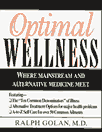- CLICK HERE TO VIEW DR. GOLAN'S ARTICLE ARCHIVE!
Cholesterol
Doesn't Tell The Whole Story
Q:
I'm a 50-year-old man, I'm 10 pounds overweight, my cholesterol
is a little high and my father had a fatal heart attack in his late
50s. My doctor recommends that I either go on a rigid low-fat diet
or take a "statin" type cholesterol-lowering drug to lessen
my risk of a heart attack. But are there other reasons, besides
cholesterol, that cause arteries to harden with plaque and cause
people to get heart attacks?
A: Good question. It's important to look beyond cholesterol to other
very relevant factors - particularly nutritional - relating to heart
disease. It is something I wish more physicians would do: It might
lessen our obsession with cholesterol-lowering drugs. I believe
in lowering cholesterol levels, but did you know that approximately
half the number of heart attacks occurs in people who do not have
high cholesterol levels? So, you see how critical it is to look
beyond cholesterol if you are interested in protecting your heart
and arteries.
There are several reasons why heart
attacks occur. If your platelets (one type of white blood cell involved
in the process of clotting) become too sticky - that is, if they
adhere too readily to each other or to rough, irregular surfaces
in your arteries, like a plaque - they will clump together and form
a clot or thrombosis inside an artery. If this happens in one of
your coronary arteries, the blood flow and oxygen supply to the
corresponding part of your heart will be injured, possibly irreversibly,
which is what a heart attack is.
But there are several populations
in the world with significant plaque in their arteries (Greenland
Eskimos, Somalis, Masai, and the Udaipur of northern India) who
have a very low incidence of heart attacks. These populations, incidentally,
have a very high-fat diet. So did Americans at the beginning of
this century. We ate as much saturated fat then as Americans did
in 1961, when deaths from heart attacks in this country were near
an all-time high - well over 500,000 deaths annually. But heart
attacks in the USA were a rare event in 1900.
One primary difference in the diet
between then and now is the rampant use of partially hydrogenated
vegetable oil, introduced early in the century. This oil is the
result of a process requiring intense heat, which chemically changes
what would normally be a liquid oil at room temperature to a solid,
and as a result creates what are called trans fatty acids.
Trans fatty acids alter the balance
of prostaglandins, an extremely important class of hormones in the
body. There are favorable and unfavorable prostaglandins, and the
kinds of fat in our diet largely control this balance. Too much
partially hydrogenated oil will favor the bad prostaglandins. This
makes your platelets too sticky and makes your coronary arteries
far more susceptible to spasm, another common cause of heart attacks,
even in individuals who do not have plaque or elevated cholesterol
levels. So these oils can assault your heart by two mechanisms.
You will find hydrogenated vegetable oil on the labels of hundreds
of foods: margarine, mayonnaise, bread, crackers, cookies, muffins,
mixes, cereals, chips, frozen foods, candy bars and artificial creamers.
The list goes on and on. According to many nutritional experts,
partially hydrogenated oil is one of the most damaging substances
in our diet. You can find packaged foods that lack this type of
oil, but you may need to shop in a health food store or locate a
supermarket that has a natural foods section.
Sugar also renders platelets more
sticky, and you know how sugar permeates our diet. In the United
States, some estimates report refined sugar consumption average
to be over 130 pounds per person per year. This is another substantial
difference in our diet today compared to 1900. Sugar also can raise
blood levels of triglycerides and lower the levels of the favorable
HDL cholesterol, increasing susceptibility to heart attacks.
Another factor behind heart attack
is a lack of essential nutrients in our refined diets. For instance,
white flour, even enriched, lacks magnesium (and a host of other
important nutrients nature endowed whole grains with). It just so
happens that a lack of magnesium contributes to platelet stickiness
and coronary artery spasm, as well as rendering the heart far more
susceptible to dangerous rhythm disturbances - all of which can
lead to heart attacks. The lack of magnesium also increases the
chance of stress-induced heart attack. If you consume very little
fruit or vegetables, the resultant lack of vitamin C will also make
your platelets sticky.
The condition of the heart itself,
an incredible muscle, can also directly play a role in susceptibility
to a heart attack. With inefficient metabolism, it has a lower tolerance
for oxygen deprivation and therefore is more likely to incur injury
under stress. This will happen with insufficient vital metabolic
nutrients such as magnesium, vitamin B6, copper, selenium, coenzyme
Q-10, L-carnitine and taurine. A sedentary lifestyle may also render
the heart less tolerant of oxygen deprivation.
There's also a widely held theory
that it's not ordinary LDL cholesterol that causes plaque formation,
but LDL cholesterol that has been damaged by oxidization. This damage
might be caused by certain forms of cooking, for instance in the
scrambling of an egg in the frying pan instead of boiling it in
the shell. Exposure to oxygen in the presence of high heat will
damage the cholesterol in the yolk. (I recommend soft-boiled or
poached eggs -the safest way to eat eggs, even for heart patients)
Fats and oils also are subject to
oxidation inside the body, more so if antioxidant nutrients are
deficient. Several years ago, a World Heath Organization study demonstrated
that the incidence of death from heart attack correlated best with
vitamin E deficiency. When beta-carotene and vitamin C deficiencies
were factored in, the correlation was even higher. It was suggested
that these nutrient deficiencies were possibly more important risk
factors for fatal heart attacks than the traditional ones: high
cholesterol, high blood pressure, diabetes, cigarette smoking and
obesity. Cardiologists are finally beginning to prescribe vitamin
E.
In recent years, another important
cause of heart attacks has surfaced: elevated levels of homocysteine.
(Actually, we have known about the importance of homocysteine for
nearly twenty-five years, but it can sometimes take this long, or
longer, for important medical discoveries to accepted.) This is
an amino acid metabolic byproduct in the body that normally should
be converted into another byproduct. However, this next biochemical
step requires certain nutrients to catalyze or "push"
the reaction. With insufficient amounts of folic acid and vitamins
B6 and B12, the reaction cannot proceed, and homocysteine will accumulate
to levels that are toxic to arteries and initiate plaque formation.
Vitamin B6 is one of the vitamins most easily lost through cooking
and processing. Folic acid comes in deep green leafy vegetables
(kale, collard, bok choy, chard, etc.), not the usual fare of most
Americans. Elevated homocysteine levels can easily be detected by
a blood test. (You might also be aware that elevated homocysteine
is linked as well to various cancers, dementia and other forms of
cognitive decline, osteoporosis, and other parameters of accelerated
ageing. So by lowering homocysteine levels you will protect far
more than your cardiovascular system.)
In recent years cardiologists at Harvard
and elsewhere have advanced the concept that arteriosclerosis is
primarily an inflammatory disease, that the build-up of plaque is
not simply a result of too much fat and cholesterol in the blood,
but the body's attempt to heal over or repair an injury to the inner
wall of arteries. We have used a blood test for decades to measure
the degree of inflammation in the body (CRP or C reactive protein).
However, a refined version of this test, high sensitivity CRP or
cardio CRP, has been developed to measure the degree of arterial
inflammation. Although the test isn't perfect (it may be high due
to other forms of inflammation like rheumatoid arthritis), it is
now considered to be the most predictive test for heart attacks
and strokes. It certainly is not meant to replace cholesterol screening
or other cardiovascular tests, but enhances our risk assessment
for heart attacks and strokes.
One possible trigger for arterial
inflammation and arteriosclerosis is infection. If you think it
was a stretch for the medical profession to embrace the homocysteine
theory of heart disease and then the inflammatory theory of heart
disease, one of the more difficult leaps has been to embrace the
theory of arteriosclerosis as an infectious disease and to treat
individuals with arterial plaque with as something as simple as
antibiotics. Enough studies have shown the presence of the bacteria,
chlamydia pneumoniae, residing in the plaques of arteries that some
physicians now prescribe a course of antibiotics for their patients
with known arteriosclerosis -- to prevent heart attacks and strokes.
Other organisms have also been implicated (mycoplasma pneumoniae,
helicobacter pylori, cytomegalo virus, and Epstein Barr virus).
As infection is a well-known trigger of inflammation and increased
free radical pathology, we can begin to see the connections between
many of the "newer" suggested cofactors for arterial disease.
When you realize the diversity of
mechanisms that can lead to a heart attack, you can begin to appreciate
that many variables need to be addressed - not just the most well
publicized one of lowering blood cholesterol levels.
This information
is provided for educational purposes only and is not intended as
a substitute for professional advice. Although the material may
help you understand a diagnosis or treatment, it cannot serve as
a replacement for the services of a licensed health care practitioner.
Any application of the material set forth is at the reader's discretion
and sole responsibility.
Email
your questions for Dr. Golan to
use a subject for his website article.
[BACK
TO TOP]
© Copyright 1999-, Ralph Golan MD
All rights reserved.
Website design, hosting and maintenance by New Tech Web, Inc.
|
![]() Dr.
Golan's Articles
Dr.
Golan's Articles





